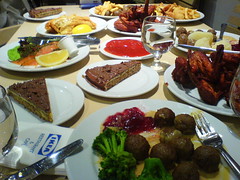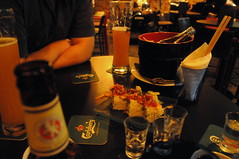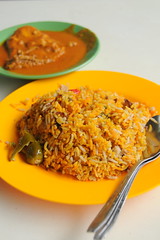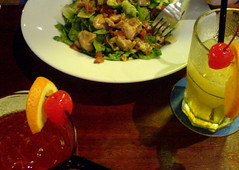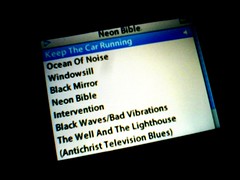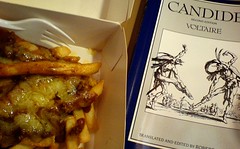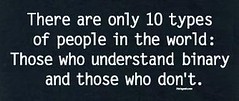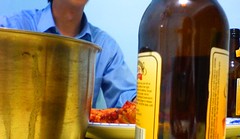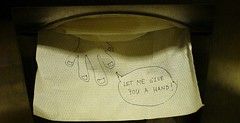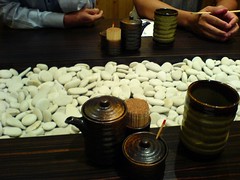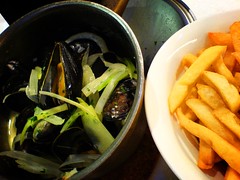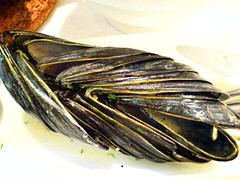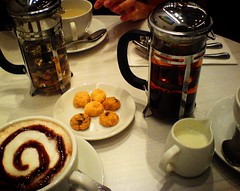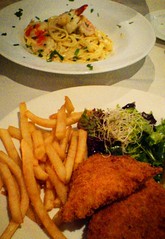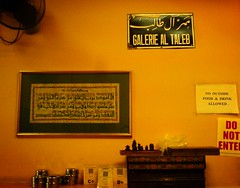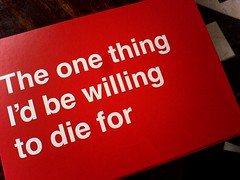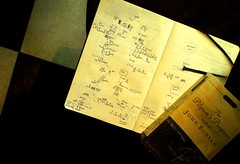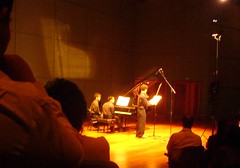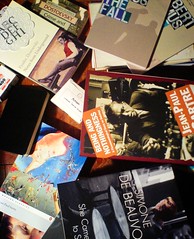The almost perpetual rain over the last few weeks ruled out all macho outdoor sports (cos those huge raindrops frighten us, yeah), leaving us with nancy indoor ones like badminton. And table tennis. And figure skating.
 Ugg CookiesUgly like the boots but less woolly and more edible
Ugg CookiesUgly like the boots but less woolly and more edible
 Fondant flowers in naff pink and naff purple. Fondant leaves in naff green.
Fondant flowers in naff pink and naff purple. Fondant leaves in naff green.
 I am pink. Therefore I am not a cabbage.
I am pink. Therefore I am not a cabbage.halfun-baked attempt.)

Woohoo! Alien eggs! Dark chocolate Maltesers.
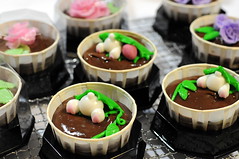 Da bunny dunna belong to Easter. So Audrey II ates him.
Da bunny dunna belong to Easter. So Audrey II ates him.
 Staging area for happycake fondant decorations awaiting deployment.
Staging area for happycake fondant decorations awaiting deployment.kitchen ex-kitchen.
So comparatively, messing about with these edibles was pretty harmless stuff, a marzipan carrot up the snot, some chocolate warming in the armpit, nothing terrible, except for the time, unbeknownst to me, someone gave away some experiments to the neighbours. I think an ambulance pulled up for the old dear next door shortly after.

Cadbury's Twirl for nesting material, Cadbury's Mini Eggs. Poof-o-meter = +1
And yeah so what if these products were chock-full of such healthy nutrients as refined sugar, refined flour, nuts specially for those allergic to nuts, scary E numbers, unidentified preservatives and the recommended daily calorie intake for a woolly mammoth? Focus on those resurrection bodies, people!
Very thankful for the few hours of sabbathing while kneading and stirring, listening to Dale Ralph Davis[4] gossiping about God in 2 Kings 3 - 7 ("The Days of Elisha"). It is always wonderful to have a womble through the Old Testament if for nothing else (but there's so much more to it), then just to ogle again at the internal consistency of different parts of the Bible written over hundreds of years by many different authors all telling parts of the same story.
There is also something about seeing how God worked in Old Testamental times that adds to our knowledge of the richness of his character and person and so the growth of our love for him. A read through a few books of the Bible tosses out the generalisation that the strict Old Testament God changed into a loving God in the New Testament. God's character remains consistent throughout the records of his dealings with mankind, so we don't have to second-guess his will at any given time.
From 2 Kings 3, we see a God who is sovereign over affairs so that he might choose not to help the ungrateful who do not acknowledge him (Elisha points out that Jehoram who has come to seek God to help him out of his impending devastation isn't making much sense. He still worships other gods, why come to God for help? And why should Elisha entertain him?) or still choose to help them inspite of their ingratitude. We also see a God who is generous and sometimes doesn't just give what is asked of him but lavishly more (Jehoram and his pals just needed water supplies. God gave them more water than they needed and not only that, but also gave their enemies the Moabites into their hands.). And wonderfully, God is a God who is willing to listen to his creatures. We do not realise what a privilege this is until we contrast this with how the king of Moab resorted to burning his own son as an offering to call in his god's favour for the battle (2 Kings 3:27).
God's generosity is also demonstrated in his willingness to give abundantly in 2 Kings 4:1-7 - the poor widow whose son was about to be sold off by creditors not only got enough oil to pay off her debts but even more than that so that she and her son could live off the proceeds. God works through the person's faith to bring about the petitioned result.
(Sometimes, when God works wonders in your life, it may be that he wants you to keep it to yourself; it may be that he doesn't want you to put it in your testimony at the next convention (Elisha, God's representative, told the widow to go into her house and close the door behind her).)
There are times that God gives, just because (2 Kings 4:8-37). God gave the wealthy old childless woman a son even though she didn't ask for one. Whereas with Sarah and Rachel a child had been necessary to continue the Abrahamic line so that God's promises could be fulfilled, this nameless son was, in that way, unnecessary.
We see also how God cares that people live in right relationship and full dependence on him. He made the self-sufficient needy so that they would relate correctly as creatures to their Creator and Sustainer. The wealthy old lady had told Elisha that she didn't need anything from God ("I dwell with my own people") but later, after the death of her only son, she held onto Elisha's feet and begged him to resurrect him, which he did.
(Despite Elisha being the agent of this miracle, we must remember the limitations of the LORD's servants. Elisha was God's representative, his wisdom and his power came from God. We must be careful not to make idols of God's servants because they can't bear the burden of God. And we too are God's servants - we may not always know what the Lord is doing in other people's lives so we should not presume to judge or advise if (as is likely) the LORD has hidden it from us (2 Kings 4:27).)
The caring nature of God does not mean that he miraculously spares his people from the circumstances they are in. The sons of the prophets in 2 Kings 4:38-41 weren't spared the famine in Gilgal. They were so in need of food that it was a real problem when the stew was rendered inedible because of some wild gourds someone had cut into it.
(God created the universe just by speaking, but he caters to our human weakness by giving us physical signs of his works: Elisha poured flour into the pot of stew to make it edible again. Similarly Jesus put his fingers into a deaf-and-mute man's ear and put his spit onto the man's tongue in the process of curing him (Mark 7:31-37). So we should not despise God-instituted signs like the breaking of the bread and the drinking of the wine in remembrance of Jesus' death and resurrection.)
Our God is a God who is not only concerned about his great plan for humanity but also for simple needs. For the son of a prophet who lost his axehead in the water, the loss was not trivial in his sight (2 Kings 6). He was poor enough not to be able to own his own axehead and had borrowed it from someone. And God was pleased to help the man in his time of genuine need even though his concern was simple.
Lest anyone think that God is just God of a little Israelite ghetto, 2 Kings 5 reminds us that God is the God of the whole world. God decides who wins and who loses in wars and in that instance, he gave victory to Syria through Naaman. God's rule is sweeping. There are no bounds to his sovereignty. And God is sovereign not just in world affairs but also in the small circumstances. He put a little Israelite servant girl in Naaman's household and she told Naaman's wife about Elisha.
Yet even though God is sovereign all things, we think that we know well enough so that we can presume to find God's ways offensive. Naaman was offended at being directed to wash in the dodgy rivers of Israel rather than the therapeutic waters of Damascus. But God, through Elisha, said that the way was narrow and there was only one way he could be healed from leprosy. In the same way, the gospel is offensive too to some people. It messes with their broadmindedness. Why only this way? Why only one way? The greatest objection to God's ways seems not to be the difficulty of their execution but that they humble our terribly misinformed pride. Yet humility, because of our inadequacy and our creatureliness, has been the right way to relate to our Creator since the first human was created.
The interesting thing is that if we'd invented God, we would have made him far more congenial. The fact that we are offended and irritated and angered by this God suggests that he might, in fact, be real.
_____________________________________________
[1] Turns out that people didn't scrape off the stuff after all. In fact, they liked the fondant and thought it tasted like tang yuan (glutinous rice balls).
[2] I therefore dub these "happycakes" (not to be confused with spacecakes) because of the alleged psychoactive tryptophan-carrying endorphin-inducing qualities of the chocolate and the hours of rampant giggling wrought by the silly fondant decorations (though not doubt also caused by the ingested chocolate).
[3] Perhaps this had more to do with the choice of beta-testers. A staffworker came over to our lunch table saying that he'd heard that chocolate cupcakes were emanating from hereabouts. When handed one for a small taster, he shovelled the lot up in about a minute and was perfectly fine after. (He did say however, that even though he was sure of his salvation, he still had young children that needed his care and that his wife mightn't be too pleased if I'd sent him on his heaven-bound way earlier than she expected.)
[4] Davis is a good combination of scholar, preacher and pastor (he current pastors and teaches at Woodland Presbyterian Church). He deals with the critical theories and interpretative problems of the text and traces the Messianic thread through the Old Testament, yet this is never merely academic but breathing doctrine to be lived out in our lives as our God lives and we live. Reckon his commentary on 2 Kings, The Power and The Fury, might be a good read.
Labels: 2 Kings, All Given For Food: Bake and Cake, All Given For Food: Chocolate, All Given For Food: Cookies, All Given For Food: Cupcakes, Easter, Rainy Day Shenanigans
